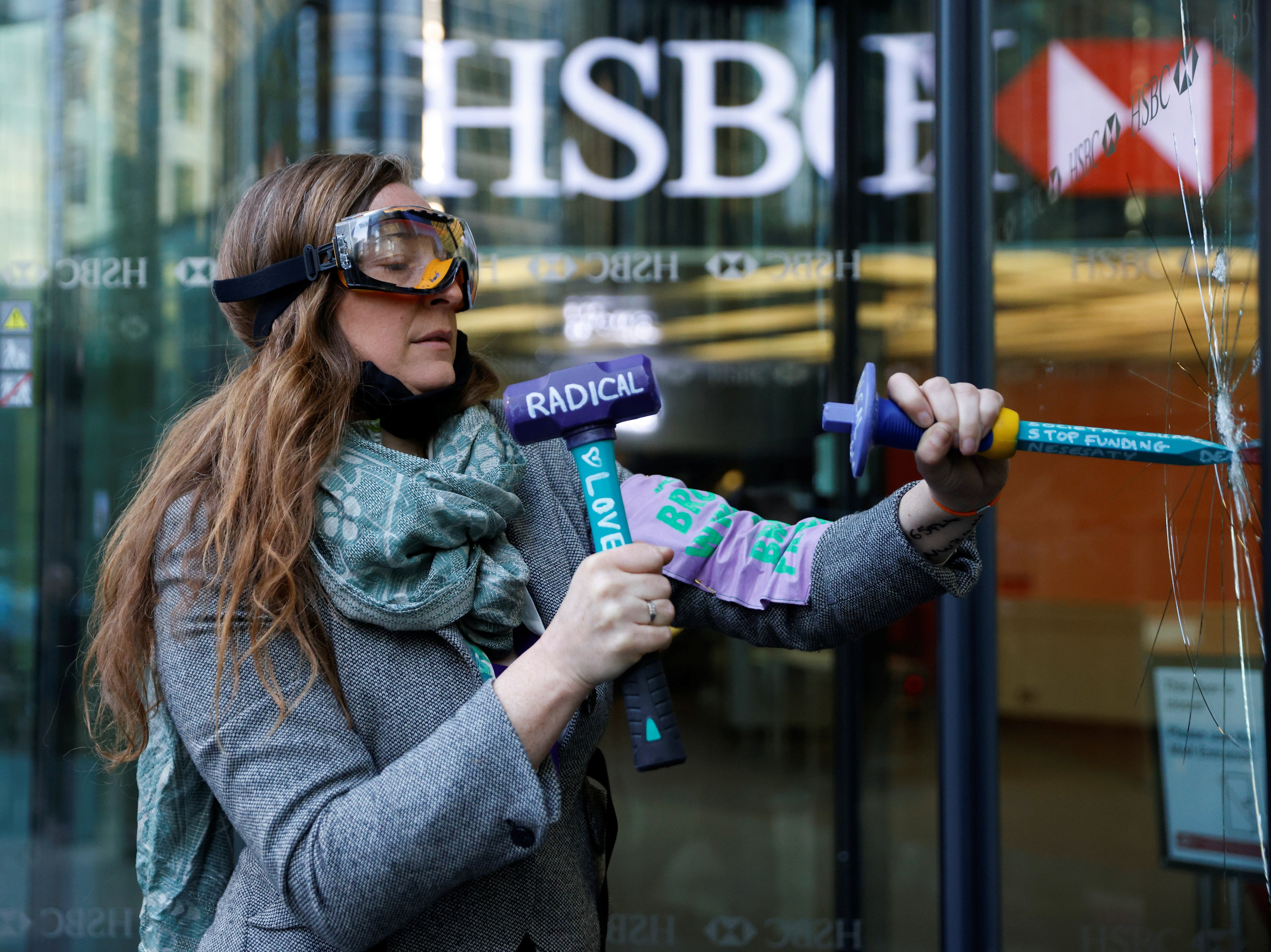HSBC richly deserves the anger of Earth Day protesters. It can and should do better by the planet
Too bad if you don’t like the tactics. It’s the bank that’s in the wrong here, writes James Moore


There’s always a danger when people engage in direct action that the subsequent debate focuses on their methods rather than on the issues they seek to raise.
I don’t propose to do that. Instead of worrying about a few broken windows that HSBC can easily afford to replace, I’m going to look at the reasons why a group of women from Extinction Rebellion and the political party Burning Pink felt that they had to act.
Like many big businesses, HSBC has made a very big fuss about its newfound commitment to the climate. This includes a “net zero” by 2050 “ambition”. There’s a pretty picture of a forest on the part of the website where it is explained.
The pledge, if that’s how this could be described, is, frankly, pathetic. It affords this hugely profitable company almost three decades to reach that goal. A sick snail with a broken shell could move faster.
The bank has also pledged to stop financing coal by 2040. If shareholders approve. Once again, slow, slow, slow. It means HSBC will continue to lend to the some of the most environmentally destructive projects it is possible to imagine for almost two more decades.
No wonder the protesters aren’t terribly impressed with its commitments at a time when even big investors have started to wake up to the very real dangers of a rapidly heating planet.
Compared with the problems, and that includes economic problems, this will cause and is already causing, a few shards of broken glass on the ground at Canary Wharf are as small as the potatoes currently in season.
By the way, I don’t know what effects the climate crisis will have on potato farmers, but you can count on it having an impact. It’s having an impact wherever you care to look.
The sad fact is that what HSBC is doing – weak promises and woolly commitments that don’t hold up to close scrutiny – is a tactic that’s being followed across large parts of the corporate sector.
That might be because it is a tactic that has, in the past, worked. Fuss over the CEO’s pay? Promise to look at the issue and come back with numbers that look slightly less absurd but are still offensive. Failing on issues of diversity? Buy off the critics by getting the headhunters to find you a female non-executive director, and then forget about the issue.
Fortunately, people are getting wise to this sort of thing.
You may recall that I highlighted the climate strategy Shell has submitted for a shareholder vote and its argument that this makes unnecessary a resolution submitted by activists at Follow This, a group seeking to change oil companies from within.
Not so. Follow This is committed to the Paris Climate Agreement. It wants Shell to make the same commitment. It is to be hoped that big shareholders back its motion, and a similar one submitted to BP. There are signs that some of them may be willing to do that.
They must be aware that continually kicking the can down the road, which is what all these companies are doing, is no longer a viable option, whether economically or socially.
Even the US, that traditional foot-dragger, is moving in the right direction under Joe Biden, with an Earth Day pledge to cut emissions by at least 50 per cent by 2030.
The best of it is that there is money to be made through a more enthusiastic adoption of decarbonisation. One of the points made by Follow This is that Shell’s investment in alternative energy represents only a small fraction of its continuing investment in fossil fuel extraction.
Its shareholders would surely benefit from a change in its thinking.
Today, Carbon Tracker released a report that helps make a strong case for renewables. The report says that global energy consumption in 2019 was 65 petawatt hours (PWh). It says that with current technologies alone, the world has the potential to capture more than 5,800 PWh annually from solar power.
Crucially, it makes the case that 60 per cent of the world’s solar resource and 15 per cent of its wind resource are already economic compared with fossil fuels.
The growth in the UK’s wind industry is an example of what can be done here.
Decarbonisation and investment in renewables constitute the direction in which the world is belatedly moving. It is high time these big hidebound companies woke up to that and shook themselves out of their torpor.
Until they do, a few broken panes of glass will be the least they deserve.
Join our commenting forum
Join thought-provoking conversations, follow other Independent readers and see their replies
Comments
Bookmark popover
Removed from bookmarks